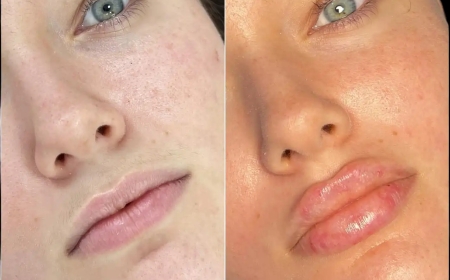Dallas Allergy Testing 101: When to Get Tested and What Your Results Really Mean
In this guide, we’ll break down when to get tested, the different testing methods available, and how to make sense of your results so you can begin your journey toward lasting relief.

Allergies can present themselves in many formsfrom relentless sneezing fits and red, itchy eyes to rashes and even digestive distress. And in a city like Dallas, where the climate and environment contribute heavily to allergy symptoms, its essential to distinguish between occasional irritation and something more chronic that needs medical attention. The first step in understanding and controlling these symptoms is allergy testing Dallas.
What Are Allergies?
An allergy occurs when your immune system overreacts to a substance (known as an allergen) that is typically harmless to others. For example, pollen, dust mites, or certain foods may trigger an immune response in allergic individuals, leading to symptoms ranging from mild to severe.
Some common signs of an allergic reaction include:
-
Sneezing and runny nose
-
Nasal congestion
-
Itchy or watery eyes
-
Chronic coughing
-
Skin rashes or hives
-
Stomach cramps or nausea after eating
-
Shortness of breath or wheezing
If youre regularly experiencing any of these symptoms, allergy testing Dallas may be the diagnostic tool you need.
When Should You Consider Allergy Testing?
Many people delay testing because they mistake allergy symptoms for common issues like colds, stress, or aging. However, knowing the right time to get tested can prevent unnecessary suffering.
Consider scheduling allergy testing if:
-
Your symptoms last more than 10 days
-
You experience recurring issues in specific seasons (like spring or fall)
-
Symptoms worsen with exposure to pets, dust, mold, or certain foods
-
Over-the-counter treatments provide only temporary relief
-
You have a family history of allergies, asthma, or eczema
-
You suffer from unexplained skin conditions or digestive issues
Allergy testing Dallas is not just about confirming whether youre allergicit's about uncovering what you're allergic to, so you can take targeted action.
What Types of Allergy Tests Are Available?
There are several reliable allergy testing methods used to diagnose allergic conditions. Your healthcare provider will determine the best option based on your symptoms, age, and medical history.
1. Skin Prick Test (SPT)
This is one of the most common and cost-effective testing methods. During the procedure, tiny drops of potential allergens are applied to your skin (typically on the forearm or back), and small pricks are made so the allergens can penetrate the skin.
If you're allergic, a small, red bump or hive will appear within 1520 minutes at the test site.
Pros:
-
Immediate results
-
Highly sensitive
-
Can test multiple allergens at once
Cons:
-
Requires stopping antihistamines beforehand
-
Not suitable for people with severe eczema or certain skin conditions
2. Intradermal Test
This is similar to a skin prick test but involves injecting a small amount of allergen just under the skin. Its usually done if skin prick results are inconclusive.
Note: This method is used more selectively, particularly for inhalant allergens like mold or pollen.
3. Blood (IgE) Test
This test measures the amount of allergen-specific Immunoglobulin E (IgE) antibodies in your blood. It's useful when skin testing isn't an optionsuch as for people taking medications that interfere with skin testing or those with skin conditions.
Pros:
-
Safe for people with skin issues
-
No need to stop medications
-
Suitable for small children
Cons:
-
Results take a few days
-
Less sensitive for certain allergens compared to skin tests
What Can Allergy Tests Identify?
Allergy testing is incredibly versatile and can detect reactions to a wide range of allergens:
Environmental Allergens
-
Pollen (from trees, grasses, weeds)
-
Mold spores
-
Dust mites
-
Pet dander
Food Allergens
-
Milk
-
Eggs
-
Wheat
-
Soy
-
Peanuts and tree nuts
-
Shellfish and fish
Contact Allergens
-
Latex
-
Nickel
-
Fragrances
-
Cleaning chemicals
Insect Allergens
-
Bee stings
-
Fire ant bites
-
Mosquito bites
By identifying these triggers through allergy testing Dallas, you can begin implementing lifestyle and medical interventions that bring relief.
Interpreting Your Allergy Test Results
Your provider will review your results with you and explain what each response means. Heres a general overview:
-
Positive result: Indicates your body produced a reaction to a specific allergen, suggesting you are allergic.
-
Negative result: Indicates no significant reaction, meaning you're likely not allergic to that substance.
-
Sensitivity scale: Some tests use a scale (e.g., 06) to show the severity of your reaction.
Its important to understand that a positive result doesn't always mean you'll have a severe reaction in daily life. It simply means your immune system has identified the allergen as a potential threat.
What Comes After the Test?
Once your results are confirmed, your provider will design a personalized treatment plan based on your allergy profile. Treatment options typically include:
1. Avoidance Strategies
This is the first and most straightforward method. If youre allergic to dust mites, for example, you can use allergen-proof covers on mattresses, remove carpeting, and wash bedding frequently in hot water.
2. Medications
Many allergic reactions can be controlled with over-the-counter or prescription medications such as:
-
Antihistamines
-
Decongestants
-
Nasal corticosteroids
-
Leukotriene receptor antagonists
These drugs dont cure allergies but help manage symptoms.
3. Immunotherapy
For those with moderate to severe allergies, immunotherapy (commonly known as allergy shots or sublingual tablets) offers long-term relief. This treatment gradually desensitizes your immune system to specific allergens.
-
Typically involves a series of injections or drops over months or years
-
Effective for pollen, dust mites, pet dander, and mold
Why Allergy Testing Matters in Dallas
Dallas is home to a mix of environmental factors that make allergy testing especially important:
-
High pollen counts: The city experiences long spring and fall seasons that trigger tree, grass, and weed pollen allergies.
-
Humidity and mold growth: Moist conditions foster mold spores, especially in older homes or during rainy seasons.
-
Urban pollution: Smog and industrial particles can worsen respiratory conditions linked to allergies.
-
Dust and indoor allergens: Fast-changing weather often keeps people indoors, where dust mites and pet dander thrive.
All of these elements can lead to confusing, overlapping symptoms. Allergy testing Dallas brings clarity, helping you understand whats happening in your body and how to take control of your environment.
How to Prepare for Your Allergy Test
Before your test, follow these guidelines for the most accurate results:
-
Avoid antihistamines for 4872 hours before skin testing (your provider will give specifics)
-
Make a list of all symptoms and when they occur
-
Record any patternslike symptoms worsening during certain seasons or after meals
-
Be ready to share family history, especially if multiple members have allergies
Frequently Asked Questions
1. How long does allergy testing take?
Skin tests typically take 2040 minutes, while blood test results may take a few days to return from the lab.
2. Is allergy testing painful?
Skin prick tests cause minimal discomfort, similar to a light scratch. Blood draws may cause a brief pinch.
3. Will I get immediate results?
Skin tests show results almost immediately. Blood test results take 25 days, depending on the lab.
4. Can I get tested if Im pregnant or on medications?
In many cases, yes. Blood testing is safer during pregnancy. Discuss your situation with your healthcare provider.
5. How often should I get tested?
Re-testing every 23 years is common, especially for children whose immune responses may change as they grow.
6. Is allergy testing covered by insurance?
Most plans do cover allergy testing if it's deemed medically necessary. Contact your provider for coverage details.
Final Thoughts
Dont wait for your symptoms to escalate or rely on guesswork when it comes to your health. With the detailed insights provided by allergy testing Dallas, you can take decisive steps to reduce exposure, control reactions, and live more comfortably.
Whether youre dealing with seasonal allergies, food sensitivities, or unexplained skin issues, testing offers clear answers and proven paths toward better health. By understanding whats triggering your symptoms, you empower yourself to make informed choicesnot just about treatment, but about how you live, eat, sleep, and breathe in your environment.
Start your allergy journey today, and discover what it truly means to feel wellright here in Dallas.






































